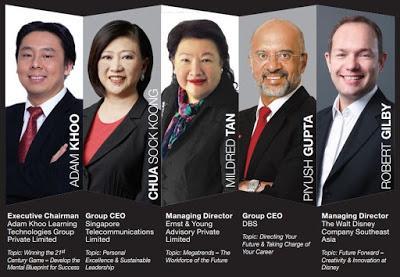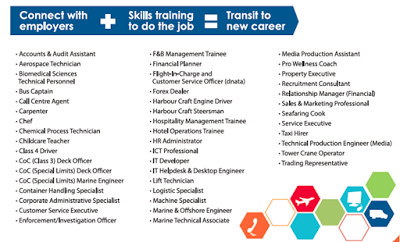The road to financial independence is sometimes not an easy one. Many people in the past such as my parents' generation born in 1950s-1960s were savers. They work hard, they save money and never really had much luxuries. Life was simple back then. However, you would have realised that the baby boomers generation still did not have much savings. This is after working hard and saving money all their lives. Why is this so?
The reason is simple, most of them could not increase their income due to circumstances back then. Some of them had to quit school early to work in order to supplement income for the household. Singapore was also transforming fast during the 1980s and 1990s which means jobs were changing fast too. Some were left stranded with their skills and experience being made redundant and this caused them to suffer wage cuts or stay stagnant in their career.

Income is an important factor on the road to financial independence. You can be saving 50% of your income but if you earn only $2000, that is just $1000 savings which is not a lot. Furthermore, if you want to start a family or have kids, it is quite hard to save if you have a low salary. I have been focusing on increasing my income which I see it necessary if I want to achieve financial independence earlier. It may take years and a lot of hard work to increase income but it will all be worth it in the end.
If you're looking at a career switch or to upgrade your skills for more income, this is the post for you.
Ways to increase your income
Find A Job You Really Like - Mid career switch is possible too
If you hate your job, most likely you're not going to do well in it. Passion has created success for many people as they no longer feel a burden to work. People with passion tend to excel in their work and create more income for themselves be it in their career or business.
The problem with finding a job you like is when we were younger, we may not have chosen the right course to study and thus not able to enter the industry we want. We may have spent $25,000 on a university education which we realise we didn't like at all. When we enter the industry we don't like, we may want to change.
With the most recent statistics by Ministry of Manpower that the unemployment rate has risen and more workers have been retrenched, it is all the more vital to know how and where to acquire the right skills. Some sectors are still lacking in manpower and in this competitive environment, without the relevant qualification, it may be hard to change industry. However, we can actually get some help in this. I too may want to change industry so I've been looking at some relevant courses to gain better competitive advantage. To my surprise, I found various schemes which are really quite useful. In this blog post, I'll list down some schemes which I found that will help us progress better in our career:
U Future Leaders Programme

(U Future Leaders Summit 2015 speaker line up)
This is a programme where there are a series of seminars, conferences and mentorship sessions to help us up-skill and even gain access to useful networks.
It comprises of:
1)Future Leaders Summit - The flagship conference featuring speakers such as the CEO of DBS, Managing director of LinkedIn, vice president of amazon etc.
2)Future Leaders Mentorship - Where industry leaders conduct mentoring sessions in a small group setting behind closed doors to help PMEs in their personal and career development.
3)Future Leaders Sectorial Programmes and Series - These are sector specific such as young engineers leadership programme, aspiring HR leaders programme, finance operations development programme and many more.
Funding for courses
This to me is the best funding for courses I've ever seen. On top of the $500 SkillsFuture which we know of, there are actually a lot of courses which are heavily subsidised for Singaporeans and PR.
Let's take for example you're seeking a career in project management, you would most probably need to be PMP certified which a lot of project management job position requires. PMP stands for project management professional. The PMP® designation is recognised worldwide as the standard of the profession.
The normal course fees for a PMP certification course would cost $2675. I did a search and found the course on NTUC learning hub website with the breakdown of the course fees. Here is a snapshot for your reference:

As you can see above, if you're a Singaporean or PR, the course fees reduces to $1129.75 as compared to the original course fees of $2675. If you're age 35 and above, you get even more subsidies that the course fees comes down to just $100-$200+ dollars. Don't forget we still can use our $500 skillsfutures credit to offset the course fees so in the end we don't really have to pay much for the whole certification course.
To remain relevant in the workplace, Singaporeans have always been encouraged to upskill. Labour chief Chan Chun Sing even said "As our economy transforms, more and more of our people will be in the PME sectors, and it is also NTUC's job to make sure that we help our PMEs remain competitive and stay ahead of the competition."
Aside from the $500 SkillsFuture credit given to all Singaporeans which can be used on a range of 10,000 courses, there are actually so many schemes to subsidise course fees for us. Some of the schemes are workfare training support scheme and SkillsFuture Mid-Career Enhanced Subsidy. If you're an NTUC member, you can also get further funding under the Union Training Assistance Programme (UTAP).
If you're interested in short courses such as communication skills or WSQ certified courses, I saw some by NTU which are quite interesting. Courses such as negotiation skills, or even WSQ Apply Statistics for Lean Six Sigma. More information on the short courses by NTU can be found here. There are also subsidies and SkillsFuture credit can be used.
Lastly, I also noticed that there is this place and train programme under WDA where it enables companies to hire workers first, then to provide them with structured training to equip them with relevant skills and knowledge.Under the programme, the trainees do not pay any fees as their training will be supported and co-funded by their employers and WDA. These trainees will also receive their salaries as usual, as they are already employed once they join the programme.
There is a whole list of conversion programme where we can switch our career to. We get employed and we get the training without any cost.
Since 2008, NTUC's e2i has also worked with various industry partners to create over 50 Place-And-Train programmes.

Getting relevant certification will help us to increase our income. The courses will also help us if we want to make a career switch into something we feel more passionate about. With the heavily subsidised courses, I think all of us can look to upgrade our skills and increase our income. Also, with programmes such as the place and train programme, switching career is no longer just a dream. There are many ways to increase our income. By just knowing more about the schemes available, we can see a better light for our career and also able to seek a passion which we yearn for.
or follow me on my Facebook page and get notified about new posts.

